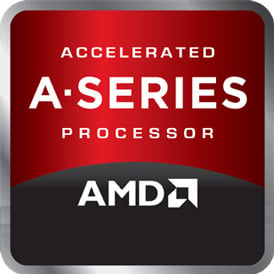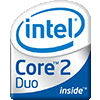
AMD A6-6400K Benchmark, Test and specs
Last updated:
The AMD A6-6400K has 2 cores with 2 threads and is based on the 3. gen of the AMD A series. The processor uses a mainboard with the FM2 socket and was released in Q2/2013. The AMD A6-6400K scores 471 points in the Geekbench 5 single-core benchmark. In the Geekbench 5 multi-core benchmark, the result is 723 points.

| Name: | AMD A6-6400K |
|---|---|
| Family: | AMD A (112) |
| CPU group: | AMD A6-6000 (3) |
| Architecture: | Richland (Piledriver) |
| Segment: | Desktop / Server |
| Generation: | 3 |
| Predecessor: | -- |
| Successor: | -- |
CPU Cores and Base Frequency
The AMD A6-6400K has 2 CPU cores and can calculate 2 threads in parallel. The clock frequency of the AMD A6-6400K is 3.90 GHz (4.10 GHz). The number of CPU cores greatly affects the speed of the processor and is an important performance indicator.
| CPU Cores / Threads: | 2 / 2 |
|---|---|
| Core architecture: | normal |
| Cores: | 2x |
| Hyperthreading / SMT: | No |
|---|---|
| Overclocking: | Yes |
| Frequency: | 3.90 GHz |
| Turbo Frequency (1 Core): | 4.10 GHz |
| Turbo Frequency (2 Cores): | 4.10 GHz |
Internal Graphics
The AMD A6-6400K has integrated graphics, called iGPU for short. Specifically, the AMD A6-6400K uses the AMD Radeon HD 8470D, which has 192 texture shaders and 3 execution units. The iGPU uses the system's main memory as graphics memory and sits on the processor's die.
| GPU name: | AMD Radeon HD 8470D |
|---|---|
| GPU frequency: | 0.80 GHz |
| GPU (Turbo): | No turbo |
| Compute units: | 3 |
| Shader: | 192 |
| Hardware Raytracing: | No |
| Release date: | Q2/2013 |
| Max. displays: | 2 |
|---|---|
| Generation: | 5 |
| Direct X: | 11.2 |
| Technology: | 32 nm |
| Max. GPU Memory: | 2 GB |
| Frame Generation: | No |
Hardware codec support
A photo or video codec that is accelerated in hardware can greatly accelerate the working speed of a processor and extend the battery life of notebooks or smartphones when playing videos.
| h265 / HEVC (8 bit): | No |
|---|---|
| h265 / HEVC (10 bit): | No |
| h264: | Decode |
| VP8: | No |
| VP9: | No |
| AV1: | No |
|---|---|
| AVC: | Decode |
| VC-1: | Decode |
| JPEG: | Decode / Encode |
Memory & PCIeThe processor can use up to memory in 2 (Dual Channel) memory channels. The maximum memory bandwidth is 29.9 GB/s. The memory type as well as the amount of memory can greatly affect the speed of the system. |
|
| Memory type: | Memory bandwidth: |
|---|---|
| DDR3-1866 | 29.9 GB/s |
| Max. Memory: | |
| Memory channels: | 2 (Dual Channel) |
| ECC: | No |
| PCIe: | |
| PCIe Bandwidth: | -- |
Thermal ManagementThe thermal design power (TDP for short) of the processor is 65 W. The TDP specifies the necessary cooling solution that is required to cool the processor sufficiently. The TDP usually gives a rough idea of the actual power consumption of the CPU. |
|
|---|---|
| TDP (PL1 / PBP): | 65 W |
| TDP (PL2): | -- |
| TDP up: | -- |
| TDP down: | -- |
| Tjunction max.: | -- |
Technical details
The AMD A6-6400K is made in 32 nm. The smaller the manufacturing process of a CPU, the more modern and energy-efficient it is. Overall, the processor has 1.00 MB cache. A large cache can greatly speed up the processor's speed in some cases such as games.
| Technology: | 32 nm |
|---|---|
| Chip design: | |
| Socket: | FM2 |
| L2-Cache: | -- |
| L3-Cache: | 1.00 MB |
| AES-NI: | Yes |
| Operating systems: | Windows 10, Linux |
| Virtualization: | AMD-V |
|---|---|
| Instruction set (ISA): | x86-64 (64 bit) |
| ISA extensions: | SSE4a, SSE4.1, SSE4.2, AVX, FMA3, FMA4 |
| Release date: | Q2/2013 |
| Release price: | 55 $ |
| Part Number: | -- |
| Documents: | -- |
Rate this processor
Benchmark results

The benchmark results for the AMD A6-6400K have been carefully checked by us. We only publish benchmark results that have been created by us or that have been submitted by a visitor and then checked by a team member. All results are based on and fullfill our benchmark guidelines.
Geekbench 5, 64bit (Single-Core)
Geekbench 5 is a cross plattform benchmark that heavily uses the systems memory. A fast memory will push the result a lot. The single-core test only uses one CPU core, the amount of cores or hyperthreading ability doesn't count.

|
Intel Celeron G1820T
2C 2T @ 2.40 GHz |
||

|
Intel Celeron J4005
2C 2T @ 2.70 GHz |
||

|
Intel Core i5-3439Y
2C 4T @ 2.30 GHz |
||
|
|
AMD A6-6400K
2C 2T @ 4.10 GHz |
||

|
AMD FX-6100
6C 6T @ 3.90 GHz |
||

|
Intel Core i3-530
2C 4T @ 2.93 GHz |
||

|
Intel Core 2 Quad Q9650
4C 4T @ 3.00 GHz |
||
Geekbench 5, 64bit (Multi-Core)
Geekbench 5 is a cross plattform benchmark that heavily uses the systems memory. A fast memory will push the result a lot. The multi-core test involves all CPU cores and taks a big advantage of hyperthreading.

|
Intel Core i3-2375M
2C 4T @ 1.50 GHz |
||

|
Intel Core i3-2377M
2C 4T @ 1.50 GHz |
||

|
AMD A6-6310
4C 4T @ 2.40 GHz |
||
|
|
AMD A6-6400K
2C 2T @ 4.10 GHz |
||

|
AMD Phenom II X2 545
2C 2T @ 3.00 GHz |
||

|
Intel Pentium E5700
2C 2T @ 3.00 GHz |
||

|
MediaTek Helio P22
8C 8T @ 2.00 GHz |
||
Cinebench R20 (Multi-Core)
Cinebench R20 is the successor of Cinebench R15 and is also based on the Cinema 4 Suite. Cinema 4 is a worldwide used software to create 3D forms. The multi-core test involves all CPU cores and taks a big advantage of hyperthreading.

|
Intel Core m3-7Y30
2C 4T @ 2.00 GHz |
||

|
AMD Athlon 5150
4C 4T @ 1.60 GHz |
||

|
Intel Celeron N2930
4C 4T @ 2.16 GHz |
||
|
|
AMD A6-6400K
2C 2T @ 4.10 GHz |
||

|
Intel Celeron N2920
4C 4T @ 2.00 GHz |
||

|
AMD A4-3400
2C 2T @ 2.70 GHz |
||

|
Intel Core2 Duo E6600
2C 2T @ 2.40 GHz |
||
iGPU - FP32 Performance (Single-precision GFLOPS)
The theoretical computing performance of the internal graphics unit of the processor with simple accuracy (32 bit) in GFLOPS. GFLOPS indicates how many billion floating point operations the iGPU can perform per second.

|
Intel Core i7-3687U
Intel HD Graphics 4000 @ 1.20 GHz |
||

|
Intel Core M-5Y10a
Intel HD Graphics 5300 @ 0.80 GHz |
||

|
Intel Core M-5Y10c
Intel HD Graphics 5300 @ 0.80 GHz |
||
|
|
AMD A6-6400K
AMD Radeon HD 8470D @ 0.80 GHz |
||

|
AMD A9-9410
AMD Radeon R5 (Stoney Ridge) @ 0.80 GHz |
||

|
AMD A6-6420K
AMD Radeon HD 8470D @ 0.80 GHz |
||

|
Intel Core i3-4025U
Intel HD Graphics 4400 @ 0.95 GHz |
||
Estimated results for PassMark CPU Mark
Some of the CPUs listed below have been benchmarked by CPU-monkey. However the majority of CPUs have not been tested and the results have been estimated by a CPU-monkey’s secret proprietary formula. As such they do not accurately reflect the actual Passmark CPU mark values and are not endorsed by PassMark Software Pty Ltd.

|
AMD Phenom II X3 700e
3C 3T @ 2.40 GHz |
||

|
Intel Celeron G3950
2C 2T @ 3.00 GHz |
||

|
Samsung Exynos 9611
8C 8T @ 2.30 GHz |
||
|
|
AMD A6-6400K
2C 2T @ 4.10 GHz |
||

|
Intel Core i7-4650U
2C 4T @ 2.90 GHz |
||

|
Intel Core i7-3667U
2C 4T @ 3.00 GHz |
||

|
Intel Pentium G4500T
2C 2T @ 3.00 GHz |
||
CPU-Z Benchmark 17 (Multi-Core)
The CPU-Z benchmark measures a processor's performance by measuring the time it takes the system to complete all benchmark calculations. The faster the benchmark is completed, the higher the score.

|
Intel Core2 Duo E7200
2C 2T @ 2.53 GHz |
||

|
Intel Pentium E2220
2C 2T @ 2.40 GHz |
||

|
Intel Pentium E6300
2C 2T @ 2.80 GHz |
||
|
|
AMD A6-6400K
2C 2T @ 3.90 GHz |
||

|
Intel Pentium B940
2C 2T @ 2.00 GHz |
||

|
Intel Pentium N3710
4C 4T @ 1.60 GHz |
||

|
Intel Celeron 1005M
2C 2T @ 1.90 GHz |
||
Benchmarks

Geekbench 5 (SC)
2,488 entries
2,488 entries

Geekbench 5 (MC)
2,461 entries
2,461 entries

Cinebench R20 (MC)
604 entries
604 entries

FP32 SP (iGPU)
2,042 entries
2,042 entries

PassMark CPU-Mark
2,392 entries
2,392 entries

CPU-Z Benchmark 17 (MC)
733 entries
733 entries

Geekbench 3 (SC)
942 entries
942 entries

Geekbench 3 (MC)
938 entries
938 entries

Cinebench R11.5 (SC)
825 entries
825 entries

Cinebench R11.5 (MC)
836 entries
836 entries
Popular comparisons
back to index




